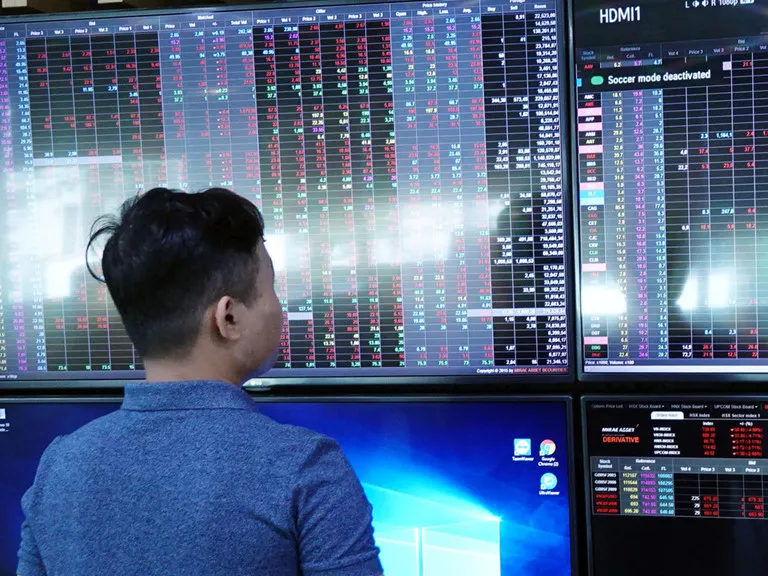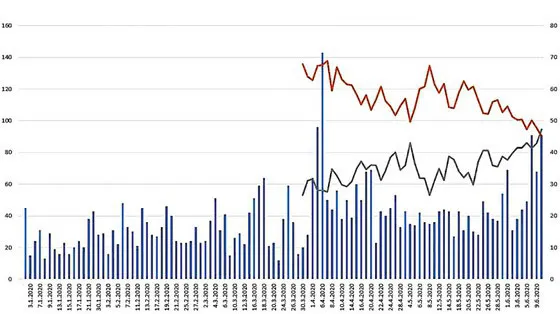
Speculative stocks
During the months of slowdown caused by the Covid-19 pandemic, the demand for essential goods such as fresh foods and processed foods had soared, which led to hike in prices of rice and pork products. Stocks of businesses benefiting from the spread of the disease, such as health related businesses and pharmaceuticals, were noticed by investors and have since seen their stocks sky rocket.
A typical example of a speculative stock in the midst of the Covid-19 pandemic is DBC, a food company that benefited from pork prices when the company increased by 312% in 53 sessions, from the end of March to the middle of June 2020. Stock prices rose when the profit in the first quarter of 2020 was 17 times higher than in the same period in 2019. Along with that, the average liquidity in this period increased ten times higher than the average in the first three months of 2020.
While some investors made huge profits, and many times over, professional investment organizations looked foolish in the market during the pandemic. For example, SSI Securities Corporation (SSI) made profit on millions of shares at the end of April 2020 when DBC shares reached highest point in history, or as the fund managed by VinaCapital sold high in the first half of May 2020. However, from mid-May to the peak on 8 June, DBC price increased by 88.4%, but in the last three sessions, DBC shares have started to fall and there has been no buying.
The second group of stocks that are expected to benefit in the post Covid-19 period are industrial zone stocks. The rush to move production out of China in an effort to diversify supply sources has caused immense disruption in the global production and supply chain. Vietnam now is expected to be an important destination, especially as the disease has been successfully contained within its borders. Therefore, businesses that lease production sites will be the biggest beneficiaries. On the stock market, there are only a few listed companies in this sector that investors have poured money into, which include ITA and KBC and these are also stocks that have seen the highest price increase up to now.
ITA stocks, from March to mid-June 2020, increased by 231.5%. Although ITA business results in the first quarter of 2020 were quite good and reported a profit of VND 25 bn, only VND 11.9 bn was gross profit from their main activity. In the first quarter revenue only increased by 4% year on year, meaning that operating profit mainly came from increased rental, reduced costs, or from other activities. Other industrial zone stocks also increased following the general trend of the market such as SZL increased by 59%, SZC increased by 73%, BCM increased by 73%, and NTC increased by 53%. The market hardly paid much attention to the actual prospect of industrial parks because the possibility of profit growth depended heavily on their ability to lease.
In the first two weeks of June, dozens of low-priced stocks rose sharply. Statistics show that the number of stocks hitting the ceiling are increasing very fast and focus on market codes below VND 10,000. In the Vietnam market, there is no standard measure of psychological factors for investors, but the number of speculative stocks increasing sharply is a good indicator. When investors get caught up in speculation trend on these codes, it means the demand for quick profit increase is very high. This is often the time when large blue-chip stocks or stable liquidity codes are no longer attractive. Only speculative stocks had price deflection regardless of basic factors.
 Chart
Chart Purchasing power may peak
It is a fact that the amount of new money entering the market has been huge in the last three months. The transaction value of the HSX and HNX has continuously seen record numbers since 2018 upto now, such as on the 8 June session of around VND 9,500 bn. Actually, the amount of capital in the market is much larger, because the Vietnamese market is limited by T+3 regulation and the balance must be sufficient before placing an order, and the amount of money converted into stocks must be accumulated in three consecutive sessions to reflect the purchasing power of investors more closely.
Statistics show that the trading value in the past three consecutive days reached a record high of approximately VND 25,500 bn on 10 June. In the last three months, the number of accounts of domestic individual investors opened were only 102,437. However, in May 2020, the number of accounts opened began to decrease compared to April, that is, 33,953 accounts compared to 36,652 accounts. The last three months have been a "honeymoon" for the market and the success stories are discussed at coffee tables. However, the boom of speculative stocks could be the climax of this late cash flow because most individual investors prefer low-price shares.




















